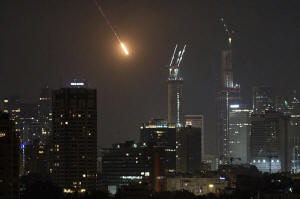Israel strikes Iran's nuclear sites and kills top generals. Iran
retaliates with missile barrages
[June 14, 2025]
By JON GAMBRELL, MELANIE LIDMAN and JULIA FRANKEL
DUBAI, United Arab Emirates (AP) — Israel launched blistering attacks on
the heart of Iran’s nuclear and military structure Friday, deploying
warplanes and drones previously smuggled into the country to assault key
facilities and kill top generals and scientists
Israel asserted the barrage was necessary before its adversary got any
closer to building an atomic weapon, although experts and the U.S.
government have assessed that Iran was actively working on such a weapon
before the strikes.
Iran retaliated by firing waves of ballistic missiles at Israel, where
explosions flared in the skies over Jerusalem and Tel Aviv and shook the
buildings below. The Israeli military urged civilians, already rattled
by the earlier wave of missiles, to head to shelter, as missiles damaged
homes and killed two people.
Iranian missiles strike Israel
Iran launched waves of missiles at Israel late Friday and early
Saturday.
A hospital in Tel Aviv treated seven people wounded in the second
Iranian barrage; all but one of them had light injuries. Israel’s Fire
and Rescue Services said they were injured when a projectile hit a
building in the city.
Hours later, an Iranian missile struck near homes in the central Israeli
city of Rishon Lezion, killing two people and injuring 19, according to
Israel’s paramedic service Magen David Adom. Israel's Fire and Rescue
service said four homes were severely damaged.
Meanwhile, the sound of explosions and Iranian air defense systems
firing at targets echoed across central Tehran shortly after midnight on
Saturday, and an Associated Press reporter could hear air raid sirens
near their home.
Iran’s semiofficial Tasnim news agency is reporting a fire at Tehran’s
Mehrabad International Airport, with a video posted on X of a column of
smoke and orange flames rising from what the outlet said was the
airport.

Iran’s Supreme Leader Ayatollah Ali Khamenei said in a recorded message
Friday: “We will not allow them to escape safely from this great crime
they committed." Iran’s U.N. ambassador said 78 people were killed and
more than 320 wounded in Israeli attacks.
Israel’s paramedic services said 34 people were wounded in the barrage
on the Tel Aviv area, including a woman who was critically injured after
being trapped under rubble. In Ramat Gan, east of Tel Aviv, an
Associated Press journalist saw burned out cars and at least three
damaged houses, including one where the front was nearly entirely torn
away.
U.S. ground-based air defense systems in the region were helping to
shoot down Iranian missiles, said a U.S. official who spoke on condition
of anonymity to discuss the measures.
Israel's ongoing airstrikes and intelligence operation and Iran's
retaliation raised concerns about all-out war between the countries and
propelled the region, already on edge, into even greater upheaval.

Israel had long threatened such a strike, and successive American
administrations sought to prevent it, fearing it would ignite a wider
conflict across the Middle East and possibly be ineffective at
destroying Iran’s dispersed and hardened nuclear program.
But a confluence of developments triggered by Hamas’ Oct. 7, 2023,
attack — plus the reelection of U.S. President Donald Trump — created
the conditions that allowed Israel to finally follow through on its
threats. Israeli Prime Minister Benjamin Netanyahu said the U.S. was
informed in advance of the attack.
On Thursday, Iran had been censured by the U.N.’s atomic watchdog for
not complying with obligations meant to prevent it from developing a
nuclear weapon.
Countries in region condemn Israel's attack
Countries in the region condemned Israel's attack, while leaders around
the globe called for immediate deescalation from both sides.
The U.N. Security Council held an emergency meeting Friday afternoon at
Iran's request. In a letter to the council, Iran’s Foreign Minister
Abbas Araghchi called the killing of its officials and scientists “state
terrorism" and affirmed his country's right to self-defense.
Israel's military said about 200 aircraft were involved in the initial
attack on about 100 targets. Its Mossad spy agency positioned explosive
drones and precision weapons inside Iran ahead of time, and used them to
target Iranian air defenses and missile launchers near Tehran, according
to two security officials who spoke on condition of anonymity.
It was not possible to independently confirm the officials' claims.
Among the key sites Israel attacked was Iran's main nuclear enrichment
facility in Natanz, where black smoke could be seen rising into the air.
It also appeared to strike a second, smaller nuclear enrichment facility
in Fordo, about 100 kilometers (60 miles) southeast of Tehran, according
to an Iranian news outlet close to the government that reported hearing
explosions nearby.
Israel said it struck a nuclear research facility in Isfahan, too, and
said it destroyed dozens of radar installations and surface-to-air
missile launchers in western Iran. Iran confirmed the strike at Isfahan.
Israel military spokesman Brig. Gen. Effie Defrin said the Natanz
facility was “significantly damaged” and that the operation was “still
in the beginning.”
Above-ground section of Natanz facility destroyed
U.N. nuclear chief Rafael Grossi told the Security Council that the
above-ground section of the Natanz facility was destroyed. He said all
the electrical infrastructure and emergency power generators were
destroyed, as well as a section of the facility where uranium was
enriched up to 60%.

[to top of second column]
|

The trace of a projectile is seen before hitting Tel Aviv, Israel,
early Saturday, June 14, 2025. (AP Photo/Leo Correa)

The main centrifuge facility underground did not appear to have been
hit, but the loss of power could have damaged the infrastructure
there, he said.
The first wave of strikes had given Israel “significant freedom of
movement” in Iran’s skies, clearing the way for further attacks,
according to an Israeli military official who spoke on condition of
anonymity because he was not authorized to discuss details of the
attack with the media.
The official said Israel is prepared for an operation that could
last up to two weeks, but that there was no firm timeline.
Among those killed were three of Iran’s top military leaders: one
who oversaw the entire armed forces, Gen. Mohammad Bagheri; one who
led the paramilitary Revolutionary Guard, Gen. Hossein Salami; and
the head of the Guard’s ballistic missile program, Gen. Amir Ali
Hajizadeh.
Iran confirmed all three deaths, significant blows its governing
theocracy that will complicate efforts to retaliate. Khamenei said
other top military officials and scientists were also killed.
Netanyahu said the attack had been months in the making. In a video
statement sent to journalists Friday, he said he ordered plans for
the attack last November, soon after the killing of Hassan Nasrallah,
the leader of Hezbollah in Lebanon, one of Iran’s strongest proxies.
Netanyahu said the attack was planned for April but was postponed.
In its first response Friday, Iran fired more than 100 drones at
Israel. Israel said the drones were being intercepted outside its
airspace, and it was not immediately clear whether any got through.
Israel’s military said it called up reservists and began stationing
troops throughout the country as it braced for further retaliation
from Iran or Iranian proxy groups.
Trump urged Iran on Friday to reach a deal with the U.S. on its
nuclear program, warning on his Truth Social platform that Israel’s
attacks “will only get worse.”
“Iran must make a deal, before there is nothing left, and save what
was once known as the Iranian Empire,” he wrote.
On Wednesday, the U.S. pulled some American diplomats from Iraq’s
capital and offered voluntary evacuations for the families of U.S.
troops in the wider Middle East. On Friday, the U.S. began shifting
military resources in the region, including ships, as Israel
prepared for more retaliation, two U.S. officials said, speaking on
condition of anonymity.
Officials in Washington had cautioned Israel against an attack
earlier in the week, so as not to disrupt U.S. negotiations with
Iran over its nuclear enrichment program. They stressed Friday that
the U.S. had not been involved in the attack, and warned against any
retaliation targeting U.S. interests or personnel.
Israel calls attacks preemptive strikes on Iran’s nuclear program
Israeli leaders cast the attack as necessary to head off an imminent
threat that Iran would build nuclear bombs, though it remains
unclear how close the country is to achieving that or whether Iran
had actually been planning a strike. Iran maintains its nuclear
program is for civilian purposes only.
"This is a clear and present danger to Israel’s very survival,”
Netanyahu claimed as he vowed to pursue the attack for as long as
necessary to “remove this threat.”
Israel is widely believed to be the only nuclear-armed state in the
Middle East but has never acknowledged having such weapons.
Over the past year, Israel has been targeting Iran’s air defenses,
hitting a radar system for a Russian-made air defense battery in
April 2024 and surface-to-air missile sites and missile
manufacturing facilities in October.
Iran says Israel targeted residential areas
For Netanyahu, the operation distracts attention from Israel’s
ongoing and increasingly devastating war in Gaza, which is now over
20 months old.
There is a broad consensus in the Israeli public that Iran is a
major threat. But if Iranian reprisals cause heavy Israeli
casualties or major disruptions to daily life, public opinion could
shift quickly.

The Iran-backed Lebanese militant group Hezbollah issued a statement
that offered condolences and condemned the attack, but did not
threaten to join Iran in its retaliation. Hezbollah’s latest war
with Israel — which killed much of the group’s senior leadership —
ended with a U.S.-brokered ceasefire in November.
Khamenei, the Iranian supreme leader, said in a statement that
Israel “opened its wicked and blood-stained hand to a crime in our
beloved country, revealing its malicious nature more than ever by
striking residential centers.”
Netanyahu expressed hope the attacks would trigger the downfall of
Iran’s theocracy, saying his message to the Iranian people was that
the fight was not with them, but with the “brutal dictatorship that
has oppressed you for 46 years.”
___
Lidman and Frankel reported from Jerusalem. Associated Press writers
Nasser Karimi, Amir Vahdat and Mehdi Fattahi in Tehran, Iran;
Melanie Lidman and Sam Mednick in Tel Aviv, Israel; Josef Federman
in Jerusalem, Israel; Lolita C. Baldor, Tara Copp, Matthew Lee and
Eric Tucker in Washington; Bassem Mroue and Abby Sewell in Beirut;
Edith Lederer at the United Nations and David Rising in Bangkok
contributed to this report.
All contents © copyright 2025 Associated Press. All rights reserved |